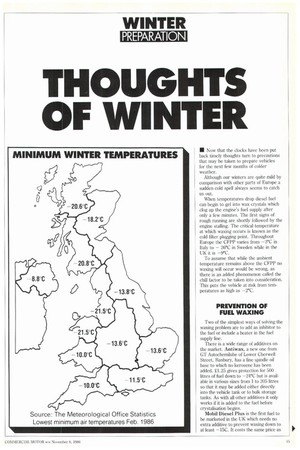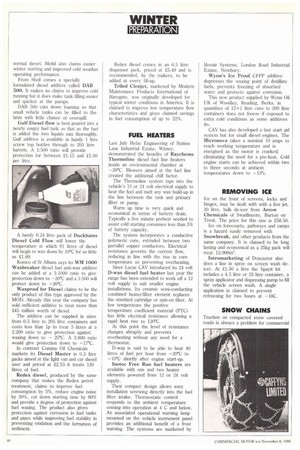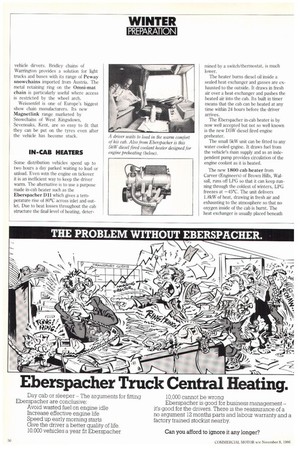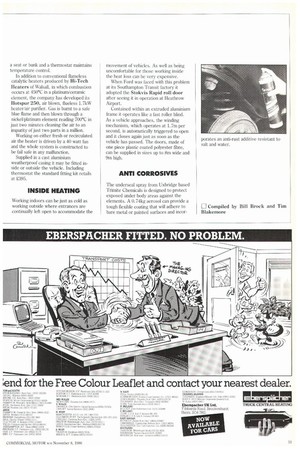THOUGHTS OF WINTER
Page 47

Page 48

Page 52

Page 53

If you've noticed an error in this article please click here to report it so we can fix it.
MINIMUM WINTER TEMPERATURES
• Now that the clocks have been put back timely thoughts turn to precautions that may be taken to prepare vehicles for the next few months of colder weather.
Although our winters are quite mild by comparison with other parts of Europe a sudden cold spell always seems to catch us out.
When temperatures drop diesel fuel can begin to gel into wax crystals which clog up the engine's fuel supply after only a few minutes. The first signs of rough running are shortly followed by the engine stalling. The critical temperature at which waxing occurs is known as the cold filter plugging point. Throughout Europe the CFPP varies from —2°C in Italy to — 26°C in Sweden while in the UK it is —9°C.
To assume that while the ambient temperature remains above the CFPP no waxing will occur would be wrong, as there is an added phenomenon called the chill factor to be taken into consideration. This puts the vehicle at risk from temperatures as high as —2°C.
PREVENTION OF FUEL WAXING
Two of the simplest ways of solving the waxing problem are to add an inhibitor to the fuel or include a heater in the fuel supply line.
There is a wide range of additives on the market. Antiwax, a new one from GT Autochemilube of Lower Cherwell Street, Banbury, has a fine spindle oil base to which no kerosene has been added. £1.25 gives protection for 500 litres of fuel down to —24°C but is available in various sizes from 1 to 205 litres so that it may be added either directly into the vehicle tank or to bulk storage tanks. As with all other additives it only works if it is added to the fuel before crystalisation begins.
Mobil Diesel Plus is the first fuel to be marketed in the UK which needs no extra additive to prevent waxing down to at least —15C. It costs the same price as normal diesel. Mobil also claims easier winter starting and improved cold weather operating performance.
From Shell comes a specially formulated diesel additive called DAB 500. It makes no claims to improve cold running but it does make tank filling easier and quicker at the pumps.
DAB 500 cuts down foaming so that small vehicle tanks can be filled to the brim with little chance of overspill.
Gulf Diesel flow is best poured into a nearly empty fuel tank so that as the fuel is added the two liquids mix thoroughly. Gulf additive is available in handy 1 litre screw top bottles through to 205 litre barrels. A 1:500 ratio will provide protection for between 21.15 and 21.50 per litre.
A handy 0.24 litre pack of Duckhams Diesel Cold Flow will lower the temperature at which 91 litres of diesel will begin to wax down by 10°C for as little as 21.69.
Komco of St Albans says its WM 1000 Waxbreaker diesel fuel anti-wax additive can be added at a 1:1000 ratio to give protection down to —20°C and a 1:500 will protect down to —30°C.
Waxproof for Diesel claims to be the only product of this type approved by the MOD. Already this year the company has sold sufficient additive to treat more than 245 million worth of diesel.
The additive can be supplied in sizes from 0.5 litre to 205 litre containers and costs less than lp to treat 5 litres at a 1:200 ratio to give protection against waxing down to — 25°C. A 1:800 ratio would give protection down to —17°C.
In contrast Comma Oil Chemicals markets its Diesel Master in 0.3 litre packs aimed at the light van and car diesel user and priced at 22.53 it treats 120 litres of fuel.
Redex diesel, produced by the same company that makes the Redex petrol treatment, claims to improve fuel consumption by 5%, reduce engine noise by 20%, cut down starting time by 80% and provide a degree of protection against fuel waxing. The product also gives protection against corrosion in fuel tanks and pipes while improving fuel stability in preventing oxidation and the formation of sediment. Redex diesel comes in an 0.5 litre dispenser pack, priced at 25.49 and is recommended, by the makers, to be added at every fill-up.
Tribol Clenjet, marketed by Modern Maintenance Products International of Harogate, was originally developed for typical winter conditions in America. It is claimed to improve low temperature flow characteristics and gives claimed savings in fuel consumption of up to 22%.
FUEL HEATERS
Last July Hefac Engineering of Station Lane Industrial Estate, Witney, demonstrated the benefits of Raychems Thermoline diesel fuel line heaters inside an environmental chamber at —20°C. Blowers aimed at the fuel line created the additional chill factor.
The Thermoline system taps into the vehicle's 12 or 24 volt electrical supply to heat the fuel and melt any wax build-up in the line between the tank and primary filter or pump.
Warm up time is very quick and economical in terms of battery drain. Typically a five minute preheat needed to assist cold starting consumes less than 5% of battery capacity.
The system incorporates a conductive polymeric core, extruded between two parrallel copper conductors. Electrical resistance governs the current flow, reducing in line with the rise in core temperature so preventing overheating.
Since Lucas CAV introduced its 24 volt D-wax diesel fuel heater last year the range has been extended to work off a 12 volt supply to suit smaller engine installations. Its ceramic semi-conducting combined heater/filter element replaces the standard cartridge or spin-on filter. At low temperature the positive temperature coefficient material (FTC) has little electrical resistance allowing a rapid heat rise to I20°C.
At this point the level of resistance changes abruptly and prevents overheating without any need for a thermostat.
D-wax is said to be able to heat 40 litres of fuel per hour from —20°C to —10°C shortly after engine start-up.
Inotec Free Run fuel heaters are available with one and two heater elements powered from 12 or 24 volt supply.
Their compact design allows easy installation screwing directly into the fuel filter intake. Thermostatic control responds to the ambient temperature corning into operation at 4 C and below. An associated operational warning lamp mounted on the vehicle instrument panel provides an additional benefit of a frost warning. The systems are marketed by Hovair Systems, London Road Industrial Estate, Newbury.
Wynn's Ice Proof CFPP additive depresses the waxing point of distillate fuels, prevents freezing of absorbed water and protects against corrosion.
This new product supplied by Wynn Oil UK of Woodley, Reading, Berks, in quantities of 12x 1 litre cans to 200 litre containers does not freeze if exposed to extra cold conditions as some additives do.
CAV has also developed a fast start aid system but for small diesel engines. The Micronova takes a nominal 10 amps to reach working temperature and is energised as the motor is cranked; eliminating the need for a pre-heat. Cold engine starts can be achieved within two to three seconds at ambient temperatures down to —15°c.
REMOVING ICE
Ice on the lront of screens, locks and hinges, may be dealt with with a five jet, 20 litre, bulk de-icer from Arrow Chemicals of Swadlincote, Burton on Trent. The price for this size is 258.50.
Ice on forecourts, pathways and ramps is a hazard easily removed with Snowbreak, and other products from the same company. It is claimed to be long lasting and economical as a 25kg pack will treat 13,900m2.
Intromarketing of Doncaster also does a line in spray on screen wash deicer. At 21.50 a litre the Spayit kit includes a 4.5 litre or 25 litre container, a spray applicator and dispensing pump to fill the vehicle screen wash. A single application is claimed to prevent refreezing for two hours at —10C.
SNOW CHAINS
'Fraction on compacted snow covered roads is always a problem for commercial
vehicle dirvers. Bridley chains of Warrington provides a solution for light trucks and buses with its range of Peway snowchains imported from Austria. The metal retaining ring on the Omni-mat chain is particularly useful where access is restricted by the wheel arch.
Weissenfel is one of Europe's biggest show chain manufacturers. Its new Magnetlink range marketed by Snowchains of West Kingsdown, Sevenoaks, Kent, are so easy to fit that they can be put on the tyres even after the vehicle has become stuck.
IN-CAB HEATERS
Some distribution vehicles spend up to two hours a day parked waiting to load or unload. Even with the engine on tickover it is an inefficient way to keep the driver warm. The alternative is to use a purpose made in-cab heater such as the Eberspacher Dll which gives a temperature rise of 80°C across inlet and outlet. Due to heat losses throughout the cab structure the final level of heating, deter
mined by a switch/thermostat, is much lower.
The heater burns diesel oil inside a sealed heat exchanger and gasses are exhausted to the outside. It draws in fresh air over a heat exchanger and pushes the heated air into the cab. Its built in timer means that the cab can be heated at any time within 24 hours before the driver arrives.
The Eberspacher in-cab heater is by now well accepted but not so well known is the new D5W diesel fired engine preheater.
The small 5kW unit can be fitted to any water cooled engine. It draws fuel from the vehicle's rhain supply and as an independent pump provides circulation of the engine coolant as it is heated.
The new 1800 cab heater from Carver (Engineers) of Brown Hills, Walsall, runs off LPG so that it can keep running through the coldest of winters, LPG freezes at —45°C. The unit delivers 1.8kW of heat, drawing in fresh air and exhausting to the atmosphere so that no oxygen inside of the cab is burnt. The heat exchanger is usually placed beneath
a seat or bunk and a thermostat maintains temperature control.
In addition to conventional flameless catalytic heaters produced by Hi-Tech Heaters of Walsall, in which combustion occurs at 450°C in a platinum/ceramic element, the company has developed its Hotspur 250, air blown, flueless 1.7kW heater/air purifier. Gas is burnt to a safe blue flame and then blown through a nickel/platinum element reading 700°C in just two minutes cleaning the air to an impurity of just two parts in a million.
Working on either fresh or recirculated air the heater is driven by a 40 watt fan and the whole system is constructed to be fail safe in any malfunction.
Supplied in a cast aluminium weatherproof casing it may be fitted inside or outside the vehicle. Including thermostat the standard fitting kit retails at 095.
INSIDE HEATING
Working indoors can be just as cold as working outside where entrances are continually left open to accommodate the movement of vehicles. As well as being uncomfortable for those working inside the heat loss can be very expensive.
When Ford was faced with this problem at its Southampton Transit factory it adopted the Stokvis Rapid roll door after seeing it in operation at Heathrow Airport.
Contained within an extruded aluminium frame it operates like a fast roller blind. As a vehicle approaches, the winding mechanism, which operates at 1.7m per second, is automatically triggered to open and it closes again just as soon as the vehicle has passed. The doors, made of one piece plastic coated polyester fibre, can be supplied in sizes up to 8m wide and 9m high.
ANTI CORROSIVES
The underseal spray from Uxbridge based Trimite Chemicals is designed to protect exposed under body areas against the elements. A 0.74kg aerosol can provide a tough flexible coating that will adhere to bare metal or painted surfaces and incor
porales an anti-rust additive resistant to salt and water.




















































































































